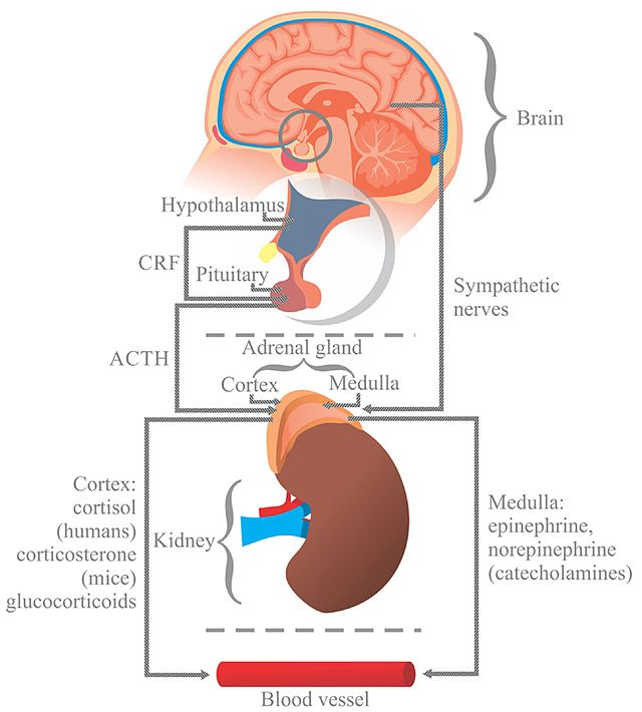Nancy’s Health Part E: Stress
Nancy’s stress levels were rising, IVF was unsuccessful, at the same time they adopted Sam, a 2 year old boy, Nancy’s mother (Mary) fell and fractured her hip.
She traveled north to assist her parents and was shocked at the physical disarray her father was in (Jack).Her stress levels continued increased with everything “on her plate”.
She fell back into old eating habits and eating was the one thing she felt she had control over.
Overview
- Stress is a natural physical & mental reaction to life experiences.
- The body responds to stress by releasing hormones that increase your heart & breathing rates & ready your muscles to respond.
- If your stress response doesn’t stop firing, it can take a toll on your health & overall well-being
Side Effects
- Anxiety
- Depression
- Irritability
- Headaches & Insomnia

Stress is a natural physical & mental reaction to life experiences. The body responds to stress by releasing hormones that increase your heart & breathing rates & ready your muscles to respond. If your stress response doesn’t stop firing, it can take a toll on your health & overall well-being.
Effects of Stress on the Body
Central Nervous and Endocrine Systems
- CNS is in charge of the “fight or flight” response
- The hypothalamus triggers the adrenal glands to release the stress hormones adrenaline & cortisol
- Increasing heart rate & sending blood to the areas that need it the most (muscles, heart, other important organs)
- When the perceived fear is gone, the hypothalamus tells all systems to go back to normal
- If the stressor does not go away, the response will continue
- Chronic stress is also a factor in behaviours such as overeating, not eating enough, alcohol, drug abuse, and social withdrawal
Respiratory and Cardiovascular Systems

- Stress hormones affect the respiratory & cardiovascular systems
- Breathing increases in an effort to quickly distribute oxygen-rich blood to the body
- The heart pumps faster
- Stress hormones cause the blood vessels to constrict & divert more oxygen to muscles
- May also increase blood pressure
- Frequent & chronic stress will make the heart work too hard for too long
- Increase risk of stroke or heart attack
Digestive System

- The liver produces extra blood sugar (glucose) to give a boost of energy
- Under chronic stress, the body may not be able to keep up with the extra glucose surge
- Chronic stress may increase the risk of developing type II diabetes
- Rush of hormones, rapid breathing, increased heart rate may upset your digestive system
- Can increase the risk for ulcers or cause existing ones to act up (ulcers are caused by a bacterium called H. pylori)
- Stress may also affect the way food moves through the body, leading to diarrhea or constipation
- May experience nausea, vomiting, stomachache
Muscular System
- Muscles tense up to protect themselves from injury during stress
- Once you relax they tend to release
- Chronic stress may not give your muscles the chance to relax
- Tight muscles cause headaches, back & shoulder pain, body aches
- Over time this unhealthy cycle may affect your ability to exercise, & pain medication for relief may be used
Sexuality & Reproductive System
- Not unusual to lose desire when under constant stress
- Short-term stress may cause men to produce more testosterone, the effect doesn’t last long
- Chronic stress will cause a man’s testosterone levels to drop
- This can interfere with sperm production & cause erectile dysfunction or impotence
- Chronic stress may increase risk of infection of male reproductive organs
- For women, stress can affect the menstrual cycle
- Irregular, heavier, or more painful menstrual periods
- Chronic stress can also magnify the physical symptoms of menopause
How has stress impacted Nancy’s cycle?
Immune System

- Stimulates the immune system, which is good for immediate situations
- Over time, stress hormones weaken the immune system & reduce the body’s response to foreign invaders
- Chronic stress causes more susceptibility to viral illnesses & other infections
- Can increase the time it takes to recover from an illness or injury
Nancy’s Thyroid
Nancy has been experiencing stress for a long time and this has caused her to be diagnosed with Malnutrition and secondary Hypothyroidism due to her dietary deficiencies.

Hypothyroidism
- There is low thyroid hormone (T3 and T4) in the blood resulting in the metabolism to slow down and is affecting her weight
- Cortisol (stress) inhibits the production Thyroid stimulating hormone (TSH) from the Pituitary gland affecting metabolism, glucose levels, and mood
Q&A
What is the treatment for Hyperthyroidism?
Increased intake of iodine rich foods such as. Seafood, daily, eggs, red meats, soy, broccoli, cauliflower, etc. Taking thyroid medications such as thyroxine (Synthroid) to stabilize mood and metabolism
List the effects Hypothyroidism has on the Musculoskeletal System.
Muscle weakness, Cold intolerance and dry skin, Stiffness, Paresthesia, Joint pain, Depressed mood , Weight gain, Changes in menstruation and difficulties with pregnancy
Critical Thinking
Nancy notices that she is eating less however she is gaining weight and she cannot understand why her old habits of binging and purging are not working. She experiences hair loss, changes in her voice, and expresses signs of depression such as poor sleep, poor hygiene, and asthenia.
Hypothyroidism (Gout) secondary to her Malnutrition
Sandwich Generation
- Nancy is now looking after a toddler & her parents
- She is still working & going to school
- Women often feel overextended
Strategies to help manage stress:
- Identify stressors
- Recognize how you deal with stress
- Find healthy ways to manage stress
- Take care of yourself
- Ask for professional support

